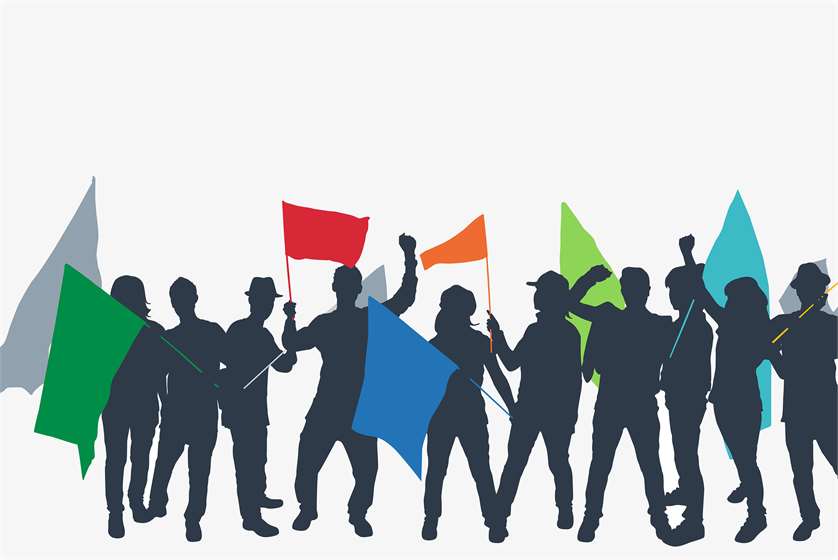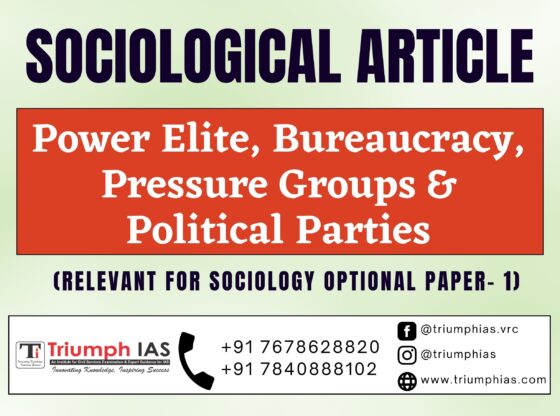Power Elite, Bureaucracy, Pressure Groups & Political Parties
Relevant for sociology optional Paper- 1 (Unit- 7 : Sociology- Politics & Society)

The concept of power elite, bureaucracy, pressure groups, and political parties is closely intertwined with the functioning of democratic societies. These institutions are responsible for shaping policies and making decisions that affect the lives of millions of people. In India, these institutions have played a crucial role in shaping the political landscape and determining the course of the country’s development. In this article, we will discuss these institutions in detail, and how they interact with each other to shape India’s political and social landscape.
Power Elite: The concept of power elite was first introduced by sociologist C. Wright Mills in his book “The Power Elite.” According to Mills, power in modern societies is concentrated in the hands of a small group of individuals who occupy key positions in government, business, and the military. These individuals are referred to as the power elite, and they exercise their influence over the rest of society through a variety of means, including the media, education, and cultural institutions.
In India, the power elite is comprised of politicians, bureaucrats, business leaders, and influential members of society. These individuals hold significant power and influence over the direction of the country’s development. They use their influence to shape policies and promote their own interests, often at the expense of the larger society. The power elite in India is often accused of being corrupt and engaging in nepotism.
Bureaucracy: The bureaucracy is a system of government in which officials are appointed based on their expertise and knowledge rather than by popular election. The bureaucracy is responsible for implementing policies and ensuring that government services are delivered efficiently and effectively. In India, the bureaucracy is a crucial part of the government, and it is responsible for implementing policies and programs that affect the lives of millions of people.
The Indian bureaucracy is often criticized for being inefficient, corrupt, and unresponsive to the needs of the people. Bureaucrats are often accused of being unaccountable and using their power to further their own interests rather than those of the public. Despite these criticisms, the bureaucracy plays a vital role in the functioning of the Indian government, and it is unlikely to be replaced anytime soon.
Pressure Groups: Pressure groups are organizations that seek to influence government policies and decisions through non-electoral means. These groups are often formed around specific issues or causes and work to promote their interests by lobbying politicians, organizing protests, and engaging in other forms of advocacy. In India, pressure groups are an important part of civil society, and they play a crucial role in promoting the interests of marginalized communities and promoting democratic values.
There are a wide variety of pressure groups in India, ranging from environmental organizations to human rights groups to business associations. These groups often have significant influence over government policies, and they can be a powerful force for change. However, pressure groups in India are also often criticized for being overly narrow in their focus and for representing only a small segment of society.
Political Parties: Political parties are organizations that seek to gain power through popular elections. They are responsible for articulating a vision for the country’s development, promoting their own candidates, and mobilizing voters to support their agenda. In India, political parties are a crucial part of the democratic process, and they play a vital role in shaping the country’s political landscape.
There are many political parties in India, ranging from the Indian National Congress to the Bharatiya Janata Party to the Communist Party of India (Marxist). Each party has its own ideology, agenda, and base of support, and they compete fiercely for power in national and state-level elections. Political parties in India are often criticized for being corrupt, dynastic, and lacking in ideology. However, they remain a crucial part of the country’s democratic process, and they are unlikely to be replaced anytime soon.
In conclusion, the institutions of power elite, bureaucracy, pressure groups, and political parties are all essential components of India’s political landscape. Each institution plays a unique role in shaping policies and determining the direction of the country’s development. While these institutions are often criticized for being corrupt, inefficient, or narrow in their focus, they remain vital to the functioning of India’s democracy. As India continues to grow and evolve, it is likely that these institutions will continue to evolve as well, adapting to the changing needs and demands of the country and its people.
For more such notes, Articles, News & Views Join our Telegram Channel. https://t.me/triumphias
Click the link below to see the details about the UPSC –Civils courses offered by Triumph IAS. https://triumphias.com/pages-all-courses.php


